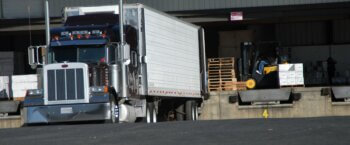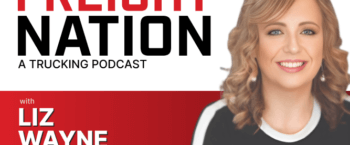Do you have what it takes to become a freight broker?

Tune in to
Freight Nation: A Trucking Podcast.
Listen in as seasoned brokers share practical knowledge.
Are you considering becoming a freight broker, or are you currently setting up your own brokerage business? Freight brokering is often a natural career step for many supply chain professionals, but to make a successful transition or set up a profitable business, it’s important to understand what a freight broker does and how they operate.
In part one of our new three-part webinar series, Truckstop’s Brett Jendra shares insights that can help you succeed in the industry.
Watch the webinar: So, You Want to Be a Freight Broker?
What does a broker do?
Put simply, a freight broker acts as a go-between between a shipper looking to transport their goods and a carrier who owns the trucks and can do the job. The broker connects the two parties and handles the financials and logistics to make sure the load arrives safely, on time and in good shape.
Freight brokers make money by collecting the difference between what the shipper pays and what the carrier charges to transport the goods—making finding freight and building carrier partnerships top priorities for any broker.
How do I find freight?
If you’re new to being a broker, finding freight may seem like a daunting process, but it doesn’t have to be. The key is knowing what resources to use, and then building the right network of partners.
Here are five channels you can use to find freight:
- Internet searches
- Cold calling prospects
- Business book services
- Emailing prospects
- Networking
Another great way to connect loads to trucks is with a load board. Online load boards like Truckstop give you access to thousands of trucks and drivers; and, you can also use the boards to research cargo rates in the shipping lanes you intend to operate in.
How do I find carriers?
Finding freight is just one half of the equation—you’ll also need to find a roster of qualified carriers. The most successful freight brokers start developing quality carrier relationships from the beginning, and many of the same tactics for finding freight are also effective ways to freight brokers start find carriers.
A good freight broker should know their carrier locations, service areas and equipment types—this helps provide your shipper customers the reliable service they need while giving your best carrier partners the most desirable loads.
How do I start a brokerage business?
Having a thorough understanding of core business fundamentals, such as regulations, taxes, employee benefits and insurance is vital to successfully running a brokerage business. When you first start out, you’ll need to register your company—which requires strategic thinking and pre-planning up front. Then, you’ll need to apply for broker authority, acquire your surety bond and purchase contingent cargo and liability insurance.
Skills that will help you realize long-term success with your brokerage business includes:
- Negotiating: Being able to negotiate the best rates and balance the difference between what the shipper will pay and what the carrier charges will help your business maximize profits.
- Day-to-day management: Managing the entire process, from carrier pickup through delivery, is vital; and keeping both parties consistently up to date helps meet customer service expectations.
- Problem solving: Vehicle breakdowns, weather events, lost or damaged goods—inevitably, something can and will go wrong. The ability to stay calm and provide proactive solutions will help your business stand out in any supply chain chaos.
- Generating new business leads: A load board can be an essential tool for brokers and can help bring in leads to generate new business.
Want to learn more?
Freight brokering can be a very rewarding career, and there will always be a need for businesses that can connect shippers and carriers. If you’re interested in more information or resources on how to become a successful freight broker, be sure to check out our recent webinar below. We’ll be posting two more parts to this series, so check back here on the Truckstop blog for updates.

Find out how our platform gives you the visibility you need to get more done.
Get helpful content delivered to your inbox.
Schedule a demo.
Find out how our platform gives you the visibility you need to get more done.





